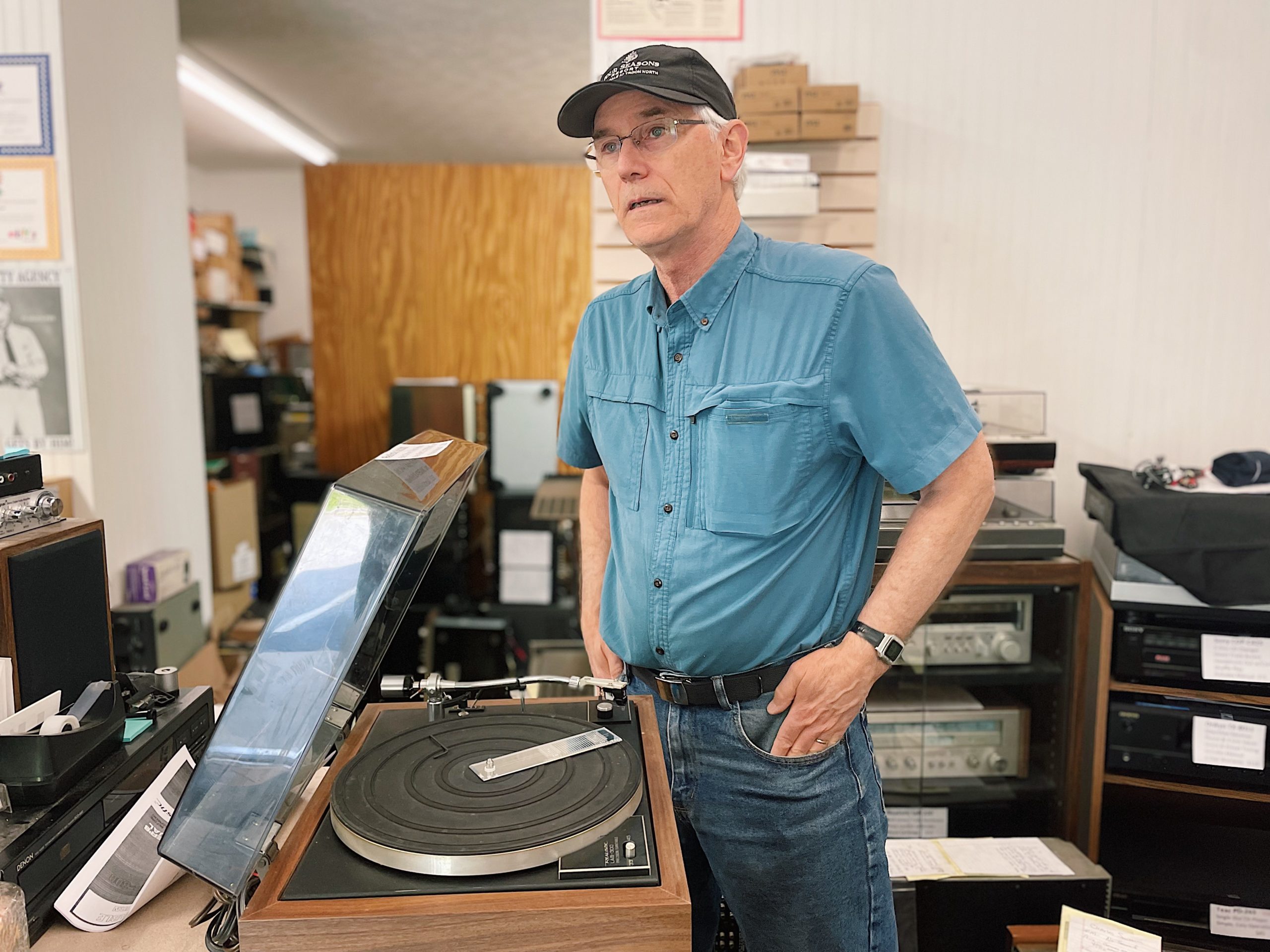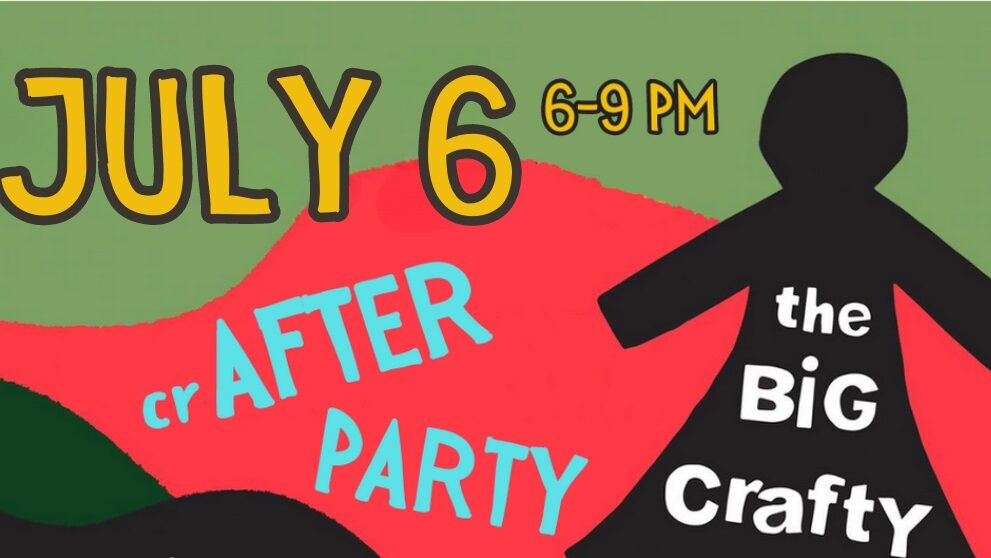The Return Of Dedicated Listening: Q&A With Audio Service Co. Owner Loyal Lawrence
- May 4, 2022 -

Sooner or later, what’s old is new again. So goes the sentiment when it comes to trends in fashion (thanks for the cardigan, Nanny ♥), and as it turns out, in audio equipment.
That’s what led me to Audio Service Co., a repair shop located in a small, nondescript shopping center in Woodfin. As millennials continue to drive vinyl sales, I thought it would be a good opportunity to talk to an expert and help field questions for hi-fi newcomers, myself included.
Inside the shop, stacks of equipment nearly grace the ceiling. Vintage audio receivers, turntables, and even a reel-to-reel tape machine. Owner Loyal Lawrence has been overseeing this grand canyon of audio relics since he opened in 1981.
Loyal is frank about it — he doesn’t need more business. But he says he’s happy to answer questions about audio equipment. His name seems to speak to his dedication. He’s loyal to his craft. His other name, his email address, does too. It’s “audionut.”
Cass Herrington: You started Audio Service Co. when you moved to Asheville more than four decades ago. What got you first interested in tinkering with stereo equipment?
Loyal Lawrence: I grew up in the 60s and 70s, arguably the best time for music and experimentation. Most teenagers in that time period were heavy into music, whether on a nice stereo or their transistor radios. I like to think we were all listening because the music was so great back then, but we also didn’t have competing interests. This was long before computers, cell phones, and even before video had taken such a prominent part of the scene.
It started as a love for music, with an interest in the audio equipment itself. I became intrigued, not only how to purchase it and how to make good decisions, but I also thought it would be super cool if I could learn how to fix it. So I went to a trade school and learned the profession. As I got more experience working on equipment, I realized it’s also an art, not just a technology.
CH: In the time that you’ve been in business, you’ve probably witnessed a variety of trends in audio formats and listening experiences. I’m thinking about how in the 90s and early 2000s, people were buying home entertainment systems, where audio was lumped into their television and movie setup. Are you seeing consumers turning away from that, and treating audio as a separate experience?
LL: I do know a lot of people turning away from elaborate home theater systems and just getting those sound bars. I think video is here to stay, but I do think there are a lot of people dividing their time. There are more people setting up stereos and actually listening to music.
In the last few decades, there was a shift away from listening to music as an experience. Music became something you turned on in the background while you were doing something else. Now, especially with more folks getting into vinyl, there’s more of an occasion where someone will actually sit down and listen to the music.
CH: That brings up the vinyl “revival” we’re experiencing – the recent increased demand for vinyl records. Have you noticed a younger generation seeking your services?
LL: Yes, I’d say roughly ten years ago. People talk like it’s something that’s just now happening, but I’d say ten years ago. At first, I was kind of amused, and thought perhaps it was just a passing fad. But so far, it hasn’t proven to be a fad, it’s proven to be something that’s going to be around for a good while. You’d think the older folks would be more likely to want to go back to records for nostalgia’s sake or because they already had some records, but it’s mostly young people. I’d say folks 30 and under.
CH: There are probably many answers for this – but, could you explain why some older turntables are better than new ones coming out today?
LL: It seems to me that manufacturers are not primarily interested in what’s best for the consumer. They’re just interested in the bottom line. And I think they know that most young people don’t know enough about turntables that they’ll go ahead and buy an inexpensive turntable and not even realize the mistake they’re making.
It also may be that the cost of manufacturing has drastically changed, to manufacture a better quality turntable would cost two or three times as much as what’s being promoted.
CH: And a cheap turntable could potentially damage your record collection, right?
LL: Yeah, the tracking force, or tracking weight, is the primary reason for this. I’ve always maintained that if you’re spending $20 or more for a record, it doesn’t make sense to buy a $150 turntable – a recent model, that is.
CH: How do you define good sound?
LL: [laughs] That’s a loaded question. It is subjective. It’s all about a person’s experience and how much exposure they’ve had to different types of speakers. You have to listen to a lot of different equipment to make some comparison.
CH: And you’ve obviously tuned your ears, listened to a lot of speakers over the years. How do you feel about the term “audiophile”?
LL: I am not what I would classify as an audiophile. I have a client who maintains that I am because of my passion for music and my love of the equipment I’m working on. Audiophiles have a reputation for being just totally subjective, and not having any scientific way to verify their conclusions. They’ll spend hundreds of dollars just on cables and speaker wire. In their minds, they think it’s a big improvement, and the average person wouldn’t even hear the difference.
There’s a lot of psychological things going on there, too. If somebody buys some real expensive equipment they’re going to want to think it’s much better than what they had. But you don’t have to spend a fortune.
CH: Kind of like how expensive wine makes people think it tastes better.
LL: Yeah, exactly.
CH: One of the things I find charming about your shop is it speaks to the ebbs and flows of human behavior and culture. Some music formats fade into the past, while others, like vinyl, get resurrected. What do predict the future of audio? Infiltrating our bodies, as people venture into virtual reality?
LL: I don’t have any predictions, really. Who would have predicted the LP coming back? I thought we would go to a completely digital format, like a thumb drive.
Thanks, Loyal.
Do you have a question for Loyal? Send us an email info@citizenvinyl.com with your question, using the subject line “ask Loyal,” for a later post in the series.




